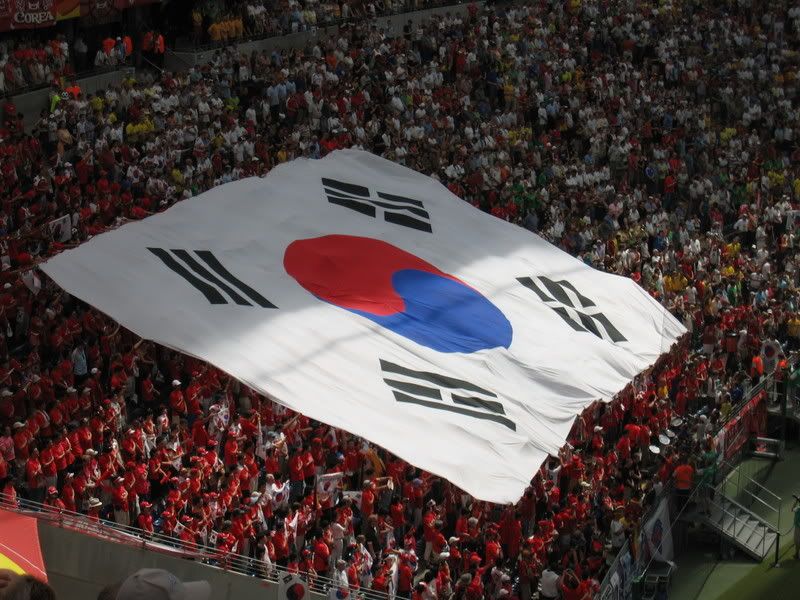Trends in Nationalism in South Korea
 This is interesting. The Chosun Ilbo has an article titled New Trends in Korean Nationalism. I was really excited and thought I'd read something really good.
This is interesting. The Chosun Ilbo has an article titled New Trends in Korean Nationalism. I was really excited and thought I'd read something really good.
However, this is the WORST article I've read on this topic. That's not to say I've read a lot of articles on Korean nationalism, but damn, this sucks ass. I know this stuff and, really, by the fourth paragraph, my eyes were glazing over. On top of it, it's got TYPOS. Damn...just damn.
It's either blog it or save it to blog later and then forget about it.
My goal is to read it and then reinterpret it for the lay person. You can try it too.
THIS is English language journalism in Korea. Shitty, no?
Enjoy...if you can.
New Trends in Korean Nationalism
South Koreans' attitude toward the U.S., as seen in the latest hostage crisis in Afghanistan, was markedly different from the anti-American sentiment vented during the kidnapping and beheading of Kim Sun-il in Iraq in June 2004. Despite some minor protests, the ratification of the Korea-U.S. free trade agreement is proceeding apace, with anti-American, pro-North Korean voices much quieter than they have been.
Several academics say the 20-year-long marriage between the Left and nationalists born in the democratic struggle against authoritarian governments in the 1970s and 1980s is coming to an end. That means farewell to the defensive, registance nationalism produced by Korea’s history in the 20th century. Foreign experts, by contrast, worry that Korean nationalism is becoming more aggressive.
Prof. Kang Won-taek of Soongsil University defines this trend as a transition from Korean nationalism to South Korean or “Republic-of-Korea” nationalism. But Kang says it would be missing the point if we regard it only as a trend of nationalists turning to the Right. According to Kang, this new South Korean nationalism owes something to the advent of a “post-386” generation who are IT- savvy and aware of globalization, and to a change in South Koreans' perception of North Korea and a more realistic understanding of the situation the Korean Peninsula finds itself in.
Prof. Kim Ho-ki, a center-left academic at Yonsei University, says the spectrum is more complex. The Right, he says, is divided into nationalists and post-nationalist or pro-market forces, and so is the Left, while in between there are centrist nationalists and post-nationalists.
The conventional nationalists on the Right stress a patriotic view of history. Rightwing post-nationalists, led by the novelist Bok Geo-il, are backed by businesses that emphasize globalization. The conventional nationalists of the Left are pro-North Korea; leading figures are Baek Nak-cheong, a professor emeritus of Seoul National University, and Kang Man-gil, a former Korea University professor. Over the past 20-odd years, this group has exercised the most powerful influence on intellectuals, their ideology a major influence on the Kim Dae-jung administration.
Leftwing post-nationalists include Prof. Jin Jung-kwon of Chung-Ang University, Prof. Sohn Ho-chul of Sogang University, and Russian-born scholar Park No-ja.
"As far as large social currents are concerned, it's clear that both intellectuals and the general public are now moving from leftwing nationalism to rightwing post-nationalism,” Kim Ho-ki said. “But we’ll need more observation and research to see what the new nationalism will look like."
Prof. Jun Sang-In of Seoul National University’s Graduate School of Public Administration says leftwing nationalism is conspicuously losing its influence among the populace, “decisively because people are disappointed by the leftwing governments of the past decade." Shin Ji-ho, the president of the “new Right” organization Liberty Union, said, "In my view, the Chun Doo-hwan regime played a role in integrating the Left and nationalists into a formidable force. And the Kim Dae-jung and Roh Moo-hyun governments have played the central role in producing a new force based on a combination of post-nationalism and the Right."
So what will it mean if the leading ideology is moving from leftwing nationalism to rightwing post-nationalism? Where will the 386 generation of former student democracy activists, who became the main proponents of leftwing nationalism in politics, turn now? And will the new South Korean nationalism -- the product of a combination of the Right and post-nationalists -- be a sort of patriotic globalism, or will it remain mired in ultra-nationalism and a chauvinism based on the ideas of “pure blood” the UN has recently criticized? The struggle for the intellectual soul of South Korea is on.












So, what are your thoughts?
ReplyDeleteYou ask me this when I have five minutes to get to class.
ReplyDeleteHonestly, this isn't new. I'd liken it to the same turndown of left leaning sentiment with the 60s generation.
A lot of those people have rolled back completely on their left wing views and are very much tethered to the right these days. I recall articles on that hitting the press in the 90s.
Basically, Korean democracy is growing up. They can't continue their economic growth with sentimentalist and unrealistic views on society and history. However, the right can be just as sentimentalist and unrealistic. Only time will tell what balance the 386-generation will strike, but I do agree that it's going to be a lot less of "American go home" and much more focused on trying to foster rather than cut connections. This is particularly so with powerful nations like the US and China (that's going to be an interesting balancing game to watch.)